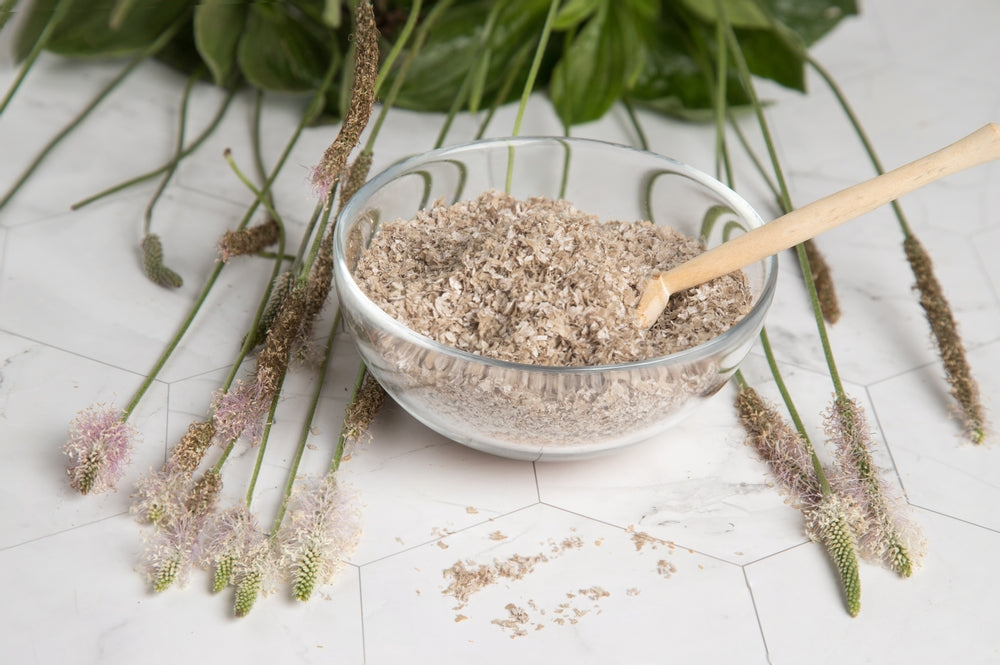Read on to discover how nature provides an easy-to-take, natural remedy to improve your digestion and help you feel more balanced.
Ever heard of psyllium? 🌾 Well, it’s a regular topic of conversation in the Natural Balance community. (Pun intended.)
Psyllium is derived from the Plantago ovata plant. Psyllium is a natural, soluble plant fiber, meaning it dissolves in water and has incalculable health benefits. Especially for your digestive system.
Fiber is indigestible by the body, but does wonders for your health. You may wonder: How can something your body can’t digest be good for you? Well, because fiber retains its molecular fibrosity throughout the digestive cycle. That means it can absorb excess moisture and keep everything else moving smoothly toward its final destination.
Psyllium comes in two forms: husk and seed. Both forms offer a range of benefits, particularly for your gut. More about both in a minute. First, let’s discuss why a balanced digestive system is so important to your health and well-being.
Why You Want Regular Digestion
You’re healthiest when your body moves nutrients and waste through you at a regular clip. “Regular” meaning anything from one or two bowel movements a day, to just three in a week.
When your gut and intestines are balanced and unobstructed, they send nutrients to their intended locations to fuel your body’s activity.
A blocked or irregular digestive system leads to problems like poor nutrient absorption, toxin buildup, and increased risks of constipation and gut inflammation.
An irregular digestive system can also mess with your gut bacteria balance. Prolonged irregularity might even up your chances of colorectal issues.
So, it’s a good idea to keep things in check by eating a balanced diet, staying hydrated, and moving your body regularly.
Psyllium’s Digestive Benefits
One of psyllium’s most well-known benefits is its ability to promote digestive regularity. Psyllium acts as a bulk-forming laxative. When mixed with water, it forms a gel-like substance that absorbs water in your intestines. This increased bulk softens stool and makes it easier to pass, relieving occasional constipation.
But psyllium isn’t just for when you’re blocked up, it can also be helpful in managing diarrhea. The same gel-like substance formed by psyllium helps absorb excess water in the stool, resulting in a more solid consistency.
Beyond its ability to address specific issues, psyllium also plays a role in supporting a healthy gut microbiome. Psyllium acts like a prebiotic, meaning it provides nourishment for the good bacteria that reside in your gut. These bacteria contribute to digestion, nutrient absorption, and even immune function.
While further research is needed, some studies suggest psyllium may also offer benefits for specific conditions like irritable bowel syndrome (IBS) and hemorrhoids.
Psyllium Husk vs. Psyllium Seed
Both psyllium husk and seed offer digestive benefits, but they have some key differences.
Psyllium Husk:
This is the outer shell of the psyllium seed and contains the highest concentration of soluble fiber. As mentioned earlier, psyllium husk forms a gel-like substance when mixed with water, making it highly effective for promoting regularity, managing constipation, and supporting gut health. Due to its finer texture, psyllium husk mixes easily into liquids and is often found in powdered form.
Psyllium Seed:
Unlike the husk, the whole seed contains both the outer shell and the inner seed. While still offering fiber, the concentration is lower compared to the husk. Psyllium seed takes longer to break down and absorb water, making it better suited for managing occasional diarrhea by absorbing excess fluids and solidifying stool consistency. Additionally, some individuals find the whole seed form easier to tolerate, as it might cause less initial bloating than the husk.
Ultimately, the best form for you depends on your individual needs and preferences. If you’re looking for a quick-acting solution for constipation or promoting gut health, psyllium husk might be the better choice. However, if you experience diarrhea or find the husk causes discomfort, psyllium seed can be a gentler alternative.
Important Considerations
If you’re considering incorporating psyllium into your routine, it’s important to be mindful of a few things. The recommended dosage of psyllium can vary depending on the form consumed and the desired effect. Also, it’s super important to get adequate water alongside psyllium to avoid potential side effects like bloating or gas, especially when you first start taking it.
The Final Word
Whether you’re seeking smoother sailing or want to solidify your gut health, psyllium’s got your back(side)!
Remember, regularity is key to feeling balanced and in tune with your body’s rhythm. So, go ahead, add a sprinkle of this fibrous magic to your routine.
Check out Natural Balance’s digestive health line for the easiest way to get some psyllium into your day-to-day diet.

